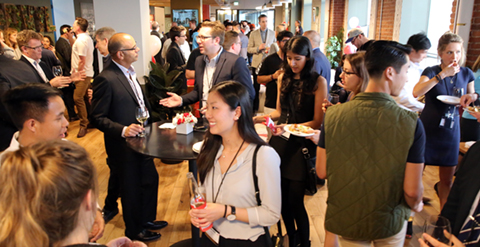SAN FRANCISCO
After escaping an Ontario snowstorm and landing in the sun-kissed global mecca of innovation, the mayors of Toronto and Waterloo Region faced their first challenge in building Canada’s answer to Silicon Valley.
While great weather might be overrated in a region where an always-on work culture is the norm, it is nonetheless a potent metaphor for the differences that do – and will always – exist between Silicon Valley and the Toronto-Waterloo Region Corridor.
As they tout the corridor to the Valley’s Canadian expats, global tech firms and venture capitalists this week, the mayors are under no illusions about those differences. But they also know many of them can work in our favour.
Chief among them are the corridor’s embrace of diversity – it’s one of the most ethnically varied regions on Earth and a magnet for entrepreneurial-minded immigrants – and a Canadian culture that makes a priority of people’s wellbeing.
Toronto Mayor John Tory summed it up well today at the CityAge conference in San Francisco, earning three separate and vigorous rounds of applause when he mentioned Canada-U.S. social differences in an impassioned speech.
“As the U.S. has been debating the size of [Republican presidential hopeful Donald] Trump’s hands, Canada recently accepted 25,000 Syrian refugees to our country, many of whom are arriving in Toronto sponsored by private families including my own,” Tory said.
“Our embrace of diversity is not just a pleasantry or the by-product of what we see as our national character . . . our diversity is also a huge competitive advantage.”

Canada House, a landing pad for Canadian startups in San Francisco, was packed
for Monday night’s mayors’ reception. (Communitech photo: Anthony Reinhart)
With thousands of immigrants among the 400,000 students attending the corridor’s 16 post-secondary institutions, “we have a lot of smart people, and we value them,” Tory said.
“We invest together, as a community, in their education, in their health care, and in the cities that they call home. We take care of each other, we respect one another and we endeavor to keep each other safe. Because of this nature, our burnout rate is lower, and our quality of life is high.
He continued: “We are consistently ranked as one of the best places in the world to live, and we manage to do that without even being able to offer a great beach or a view of the mountains.”
Of course, these facts aren’t lost on the estimated 300,000 Canadians in Silicon Valley, a few hundred of whom turned out on Monday to meet Tory – along with Kitchener Mayor Berry Vrbanovic, Waterloo Mayor Dave Jaworsky and Cambridge Mayor Doug Craig – at a series of stops at Silicon Valley tech companies, and later at an evening reception in San Francisco.
Still, the mayors came away from those Monday meetings with the impression the Toronto-Waterloo Region story – specifically, how quickly its tech sector has grown in the past couple of years – has yet to reach many expats, as well as several large U.S. companies that might consider expanding their Canadian presence.
“They don’t know the story,” Tory said in an interview after his speech. “They even told us in some of these meetings, ‘You’ve got to market yourselves,’ and I said, ‘Well, that’s why we’re here.’”
Speaking on a CityAge panel this afternoon, Vrbanovic also touched on social values as a differentiator for the corridor, citing recent charitable initiatives by people at Waterloo Region-based offices of Vidyard and NetSuite as examples of tech leadership to head off the types of problems the Bay Area has seen.
Expats, obviously, are prime targets for repatriation to Toronto-Waterloo Region, given our growth-stage tech companies’ critical need for global-level talent to help them scale. I’m speaking with several of them this week for a story that will appear later, but can report that there are significant factors that keep many of them here, despite the stratospheric cost of housing, deeper social problems and the divisive politics as embodied by Donald Trump.
Most of these factors relate – perhaps not surprisingly – to work; specifically, the sheer abundance of opportunities in the Bay Area to work on interesting projects with some of the world’s smartest people.
The mayors can surely counter with the argument that, sheer numbers aside, we are no slouches on the quality and ingenuity of companies and research institutes in the corridor.
They are touting those very qualities as they move throughout the Valley, hoping to lay track for a much larger, better funded Ontario ecosystem that stands a better chance of keeping our best and brightest at home.
It’s no small task, and one that will require not only more capital, but significant infrastructure investments and potential policy changes at higher levels of government.
Then again, no one here this week can accuse these polite Canadian mayors of thinking small.
“We’re here to sell ourselves unabashedly,” Tory said in winding up his speech. “We want people to come. We want them to come and live, we want them to come and work, we want them to come and succeed, and we want them to come and show the world that there is a way to do this that is a bit different, but that I think is entirely consistent with what’s going on in the 21st century that we want to see going on.”

